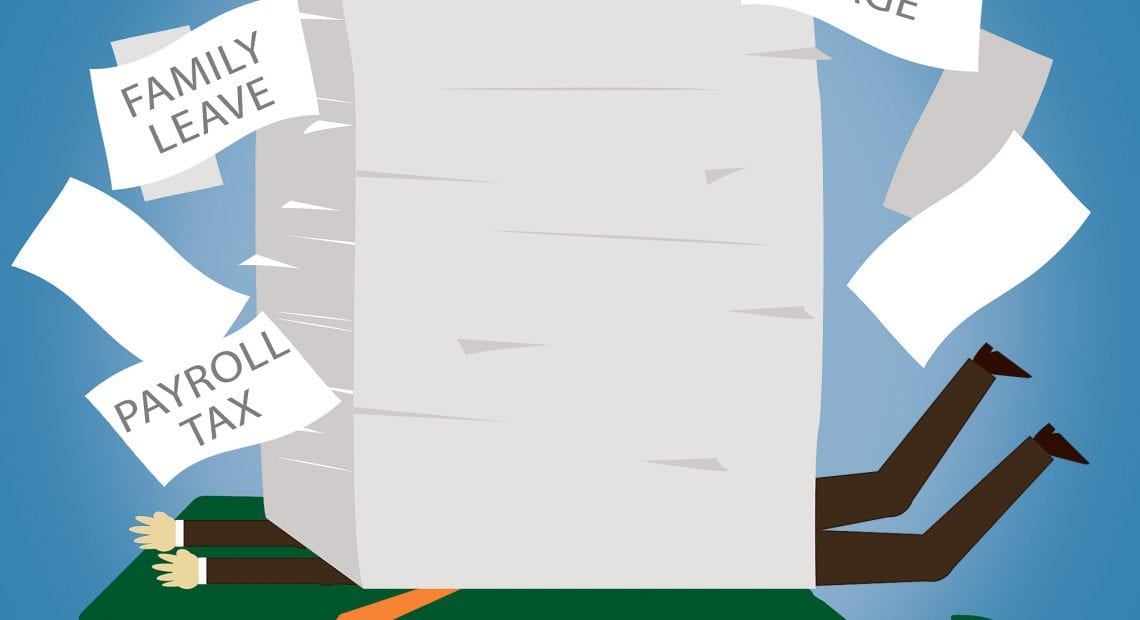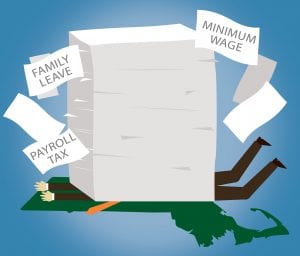
Legislation Poses Challenges for Businesses
Bargain or Burden?
 With a series of employment-related ballot questions looming — on issues including paid leave, minimum wage, and the state sales tax — supporters of those measures sat down this past spring with advocates for the business community to forge what became known as the ‘grand bargain.’ The result doesn’t have employers cheering — in fact, they worry about the impact of the deal on their bottom line — but if the nature of compromise is that no one’s happy, then the process was a rousing success.
With a series of employment-related ballot questions looming — on issues including paid leave, minimum wage, and the state sales tax — supporters of those measures sat down this past spring with advocates for the business community to forge what became known as the ‘grand bargain.’ The result doesn’t have employers cheering — in fact, they worry about the impact of the deal on their bottom line — but if the nature of compromise is that no one’s happy, then the process was a rousing success.
Carol Campbell, like so many other Massachusetts employers, was none too pleased when a barrage of ballot questions were set to go before voters on Election Day, one asking for increased paid leave, a second to raise the minimum wage to $15 per hour, and a third to reduce the sales tax from 6.25% to 5%.
“My first thought was that it shouldn’t have come to this,” said Campbell, president of Chicopee Industrial Contractors. “The way issues like this are supposed to be dealt with is through our legislators.”
But once those questions were approved for the ballot — and polls suggested that voters were ready to usher in these broadened employee benefits — employers and the organizations that advocate for them decided to sit down and hammer out a different strategy. A compromise.

Carol Campbell says thorny issues of employee benefits should be legislated, not subject to the whims of the ballot box.
That deal, forged by proponents of the ballot questions and employer-advocacy organizations, was passed by both chambers in the State House and signed into law by Gov. Charlie Baker in June. Known as the ‘grand bargain,’ the compromise legislation will create a permanent sales-tax holiday, increase the minimum wage over the next five years, and create a new paid family and medical leave program in Massachusetts — while the three ballot questions were removed from voters’ hands.
“I think we needed to sit down and talk,” Campbell said. “I was saying a couple of years ago, when this was bubbling, that we should begin by sitting down and talking. I do still have concerns because there are still a lot of unknowns. But I guess it’s better than letting something like family leave go to the ballot.”
Mark Adams, director of HR Solutions at the Employers Assoc. of the NorthEast, has spent time with employers anxious about putting sweeping benefit changes in front of voters.
“This was something that had to be dealt with because it was going to pass in November,” he told BusinessWest. “I talked to companies frustrated with the prospect of the ballot, saying, ‘how could this happen?’ My answer is simple: when you’re dealing with a ballot question, whoever gets more votes is going to win — and more employees vote than employers. Being able to take time off and be paid while taking time off resonates with employees — even if, in some cases, they might be on the hook for some of those costs. It certainly plays well, which is why it was going to pass in November, and why it was worthwhile to try to compromise.”
Nancy Creed, president of the Springfield Regional Chamber, was the sole Western Mass. voice on the seven-person committee that hammered out the bargain.
“The business community, with the support of the legislative delegation, realized, when we took a look at the polls, that we were going to lose the ballot questions, and everyone felt that we should need to come to the table and compromise,” she noted. “The more we explain that to our members, the more they understand it. They don’t like it, but they recognize that we had no choice but to do it.”
The Nitty Gritty
The grand bargain raises the Commonwealth’s minimum wage from $11 to $15 per hour over the next five years, with the initial increase taking effect in January 2019. Coupled with that increase will be a raise to the minimum base wage rate for tipped workers, from $3.75 to $6.75, that will also phase in over a five-year period starting in January 2019. The deal also phases out the requirement that retail workers earn time-and-a-half for working on Sundays.
The legislation also creates a permanent two-day weekend sales tax holiday, an event that was launched in Massachusetts in 2004 and held most years since, but not in 2016 or 2017. Proponents of lower taxes agreed, as part of the deal, to scrap lowering the state’s sales tax from 6.25% to 5%.
The third major component the bill introduces is a new paid family and medical leave program, which will provide employees who contribute to the program the ability to take paid leave for up to 12 weeks a year to care for a family member or bond with a new child, 20 weeks a year to deal with a personal medical issue, and up to 26 weeks to deal with an emergency related to deployment of a family member for military service.
Weekly benefit amounts will be calculated as a percentage of the employee’s average weekly wage, with a maximum weekly benefit of $850. Self-employed workers may opt into the program. And all workers who use the benefit are guaranteed they can return to their previous job or an equivalent position in terms of pay, status, and benefits.
Workers on paid leave will earn 80% of their wages up to 50% of the state average weekly wage, then 50% of wages above that amount, up to an $850 cap. The law includes a payroll tax increase of 0.63% estimated to bring in $750 to $800 million each year, to help fund the leave benefit.

Nancy Creed says the expanded family-leave benefits will challenge companies not only in cost, but in workforce management.
“Paid family leave was a beast; it is so complex,” Creed said, adding that this was one area where she was glad Western Mass. had representation in the discussion. “There’s an east-west disparity, and they do not understand the issues of the west and the fact that we have five gateway cities. We have a much poorer population, and our businesses tend to be smaller. Most of them [in the east] represented larger corporations, and corporations that weren’t necessarily doing the right thing.”
The members she speaks with want to do the right thing, she added.
“But you really have to look at what is the impact going to be. And it’s not just cost; it’s also workforce management. For a company that has 50 employees, if they lose five people on leave, how do they manage that, if they’re running two shifts, three shifts?”
The cost component is also significant, she went on, especially for companies that decide to foot employees’ share of the benefit in order to retain their talent and recruit more workers in a very competitive market.
“What that means is they won’t be able to hire, they won’t be able to expand, and, if they have vacancies through attrition, they probably won’t fill them because they just can’t afford to,” Creed said. “So, at a time when we’re trying to put people to work, it will probably mean less jobs. And I’m not sure the proponents understood what those consequences were.”
Still, the negotiations resulted in a better deal for employers than the ballot question, which called for 16 weeks of family leave and 26 weeks of personal medical leave. The compromise also includes an opt-out provision for employers that offer benefits greater than or equal to what an employee would receive in the state program.
“I have a hard time with people telling me how to run my business,” Campbell said. “We have short-term and long-term disability; we understand the importance of keeping our employees healthy; we understand the need for family-work balance. But it’s not always possible to have that balance. For us as a small business, if we have two or three people out for 26 weeks, it’s not as simple as hiring someone to replace them, although that in itself brings another financial burden to the company.”
Policy Briefs
One aspect of the legislation that has not gotten enough attention, Adams said, is the anti-retaliation aspects of the leave law.
“A lot of the coverage up to this point has been on the time off being available. There hasn’t been a lot of discussion about the retaliation provisions. If an employer is subject to any adverse actions within six months time under paid family leave law, there’s an automatic presumption that retaliation has occurred, and that employer can overcome that only through clear and convincing evidence that it’s something else.”
That means employers need to tighten up policies on performance evaluation, he added. “If people aren’t meeting standards, there has to be documentation that’s clearly communicated. If you’re on paid family leave and I discover you did something wrong before your leave occurred, if I don’t have documentation lined up before taking action, you can claim retaliation. That’s something companies will have to self-assess — whether their policies now are strong enough.”
Mark Adams
“A lot of the coverage up to this point has been on the time off being available. There hasn’t been a lot of discussion about the retaliation provisions. If an employer is subject to any adverse actions within six months time under paid family leave law, there’s an automatic presumption that retaliation has occurred, and that employer can overcome that only through clear and convincing evidence that it’s something else.”
It’s just one example of unintended consequences that proponents of the original ballot questions might not have considered, Creed noted. Other elements of the grand bargain, however, were easier to hammer out.
“Minimum wage was a given, as a lot of businesses are already there or moving toward it. But we were able to negotiate that being phased in over longer period of time so smaller and medium-sized businesses have time to phase up to that point,” she told BusinessWest.
Interestingly, she added, while the minimum wage for tipped employees will be phased in over five years as well, the committee heard input from some servers and bartenders who were opposed to a dramatic change, “because they think one of the unintended consequences of that is that people now think you’re paying more, so I’m going to tip you less.”
Campbell said the minimum-wage increase won’t effect her company, which doesn’t hire anyone at that low pay level, but she argued that a sizable increase in the pay floor may harm the employment picture by shrinking the number of entry-level jobs for people with little experience. Minimum-wage jobs, she noted, are “the first step toward getting an education and getting proper training to have a career. It was never meant to be supportive of a family.”
As for other components of the bargain, dropping the sales-tax decrease was relatively straightforward, Creed said. “We already have no money to find education and transportation and all the things we need to fund, without bringing in even less sales tax. But at least we were able to get that permanent sales-tax holiday, which helps the retailers.”
The Retailers Assoc. of Massachusetts, which was pushing the sales-tax ballot question, was also heartened by a recent Supreme Court decision allowing states to collect taxes on online purchases.
According to John Regan, executive vice president, Government Affairs at AIM, who had a seat at the table for the grand-bargain talks, the negotiations were carried out against the backdrop of polls indicating overwhelming support for all three ballot questions; recent polls put support for the paid family and medical leave question at 82% and support for a $15 minimum wage at 78%.
“Experts believe that a campaign to defeat questions with those sorts of poll numbers could cost $10 million per initiative,” he added. “The ballot process is one-sided, winner-take-all. Coming to a legislative compromise avoids that by allowing a broader group of people to have input into key decisions to create policies that work for everyone.”
One impetus for bringing the Raise Up Coalition, which sponsored the ballot questions, to the table was the state Supreme Court blocking a fourth question, concerning the so-called ‘millionaire tax,’ a proposed 4% surcharge on incomes over $1 million.
“Once that came off the ballot and was deemed unconstitutional, that brought the other side to the table to realize that, ‘yeah, maybe we should compromise,’” Creed said. “Would we have liked to have seen it differently? Sure, but I think the whole definition of compromise is that no one’s happy, so we did our job. It’s much better than it could have been.”
Richard Lord, president and CEO of AIM, agreed. “While everyone gives something during a negotiation, we are satisfied and believe that our member employers are better off with a legislative compromise than with voter approval of the language of the ballot questions as drafted.”
No Winners
Adams told BusinessWest that different issues with the grand bargain will manifest themselves over time, with the 0.63% tax increase on wages being the most immediate concern, especially for larger companies. “That’s really going to put HR managers behind the eight-ball from a planning point of view.”
Still, Creed added, “a negotiation is messy, and no one really came out a winner. I think the proponents didn’t feel like they came out a winner because they had to compromise. In the end, it was much better than what the ballot questions would have provided.”
Joseph Bednar can be reached at [email protected]





